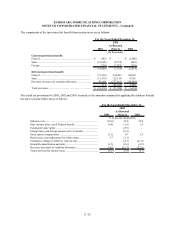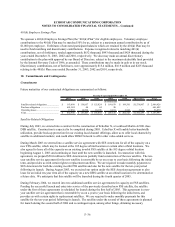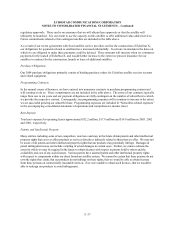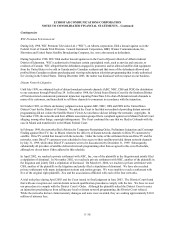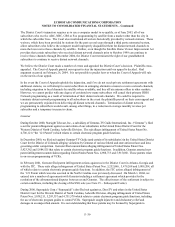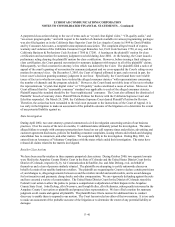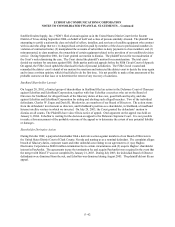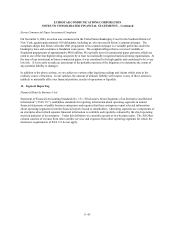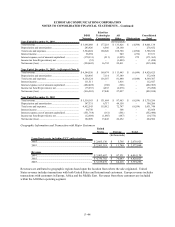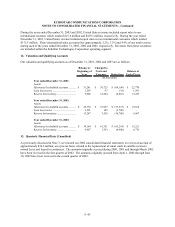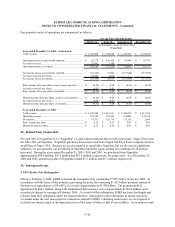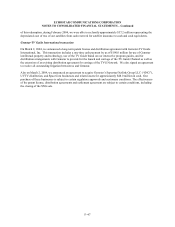Dish Network 2003 Annual Report Download - page 108
Download and view the complete annual report
Please find page 108 of the 2003 Dish Network annual report below. You can navigate through the pages in the report by either clicking on the pages listed below, or by using the keyword search tool below to find specific information within the annual report.ECHOSTAR COMMUNICATIONS CORPORATION
NOTES TO CONSOLIDATED FINANCIAL STATEMENTS – Continued
F–41
A purported class action relating to the use of terms such as “crystal clear digital video,” “CD-quality audio,” and
“on-screen program guide,” and with respect to the number of channels available in various programming packages
was also filed against us in the California State Superior Court for Los Angeles County in 1999 by David Pritikin
and by Consumer Advocates, a nonprofit unincorporated association. The complaint alleges breach of express
warranty and violation of the California Consumer Legal Remedies Act, Civil Code Sections 1750, et seq., and the
California Business & Professions Code Sections 17500 & 17200. A hearing on the plaintiffs’ motion for class
certification and our motion for summary judgment was held during June 2002. At the hearing, the Court issued a
preliminary ruling denying the plaintiffs' motion for class certification. However, before issuing a final ruling on
class certification, the Court granted our motion for summary judgment with respect to all of the plaintiffs’ claims.
Subsequently, we filed a motion for attorney’s fees which was denied by the Court. The plaintiffs filed a notice of
appeal of the court's granting of our motion for summary judgment and we cross-appealed the Court's ruling on our
motion for attorney's fees. On December 5, 2003, the Court of Appeal affirmed in part; and reversed in part, the
lower court’s decision granting summary judgment in our favor. Specifically, the Court found there were triable
issues of fact as to whether we may have violated the alleged consumer statutes “with representations concerning
the number of channels and the program schedule.” However, the Court found no triable issue of fact as to whether
the representations “crystal clear digital video” or “CD quality” audio constituted a cause of action. Moreover, the
Court affirmed that the “reasonable consumer” standard was applicable to each of the alleged consumer statutes.
Plaintiff argued the standard should be the “least sophisticated” consumer. The Court also affirmed the dismissal of
Plaintiffs’ breach of warranty claim. Plaintiff filed a Petition for Review with the California Supreme Court and
EchoStar responded. On March 24, 2004, the California Supreme Court denied Plaintiff's Petition for Review.
Therefore, the action has been remanded to the trial court pursuant to the instructions of the Court of Appeal. It is
too early in the litigation to make an assessment of the probable outcome of the litigation or to determine the extent
of any potential liability against us.
State Investigation
During April 2002, two state attorneys general commenced a civil investigation concerning certain of our business
practices. Over the course of the next six months, 11 additional states ultimately joined the investigation. The states
alleged failure to comply with consumer protection laws based on our call response times and policies, advertising and
customer agreement disclosures, policies for handling consumer complaints, issuing rebates and refunds and charging
cancellation fees to consumers, and other matters. We cooperated fully in the investigation. During May 2003, we
entered into an Assurance of Voluntary Compliance with the states which ended their investigation. The states have
released all claims related to the matters investigated.
Retailer Class Actions
We have been sued by retailers in three separate purported class actions. During October 2000, two separate lawsuits
were filed in the Arapahoe County District Court in the State of Colorado and the United States District Court for the
District of Colorado, respectively, by Air Communication & Satellite, Inc. and John DeJong, et al. on behalf of
themselves and a class of persons similarly situated. The plaintiffs are attempting to certify nationwide classes on
behalf of certain of our satellite hardware retailers. The plaintiffs are requesting the Courts to declare certain provisions
of, and changes to, alleged agreements between us and the retailers invalid and unenforceable, and to award damages
for lost incentives and payments, charge backs, and other compensation. We are vigorously defending against the suits
and have asserted a variety of counterclaims. The United States District Court for the District of Colorado stayed the
Federal Court action to allow the parties to pursue a comprehensive adjudication of their dispute in the Arapahoe
County State Court. John DeJong, d/b/a Nexwave, and Joseph Kelley, d/b/a Keltronics, subsequently intervened in the
Arapahoe County Court action as plaintiffs and proposed class representatives. We have filed a motion for summary
judgment on all counts and against all plaintiffs. The plaintiffs have filed a motion for additional time to conduct
discovery to enable them to respond to our motion. The Court has not ruled on either of the two motions. It is too early
to make an assessment of the probable outcome of the litigation or to determine the extent of any potential liability or
damages.



